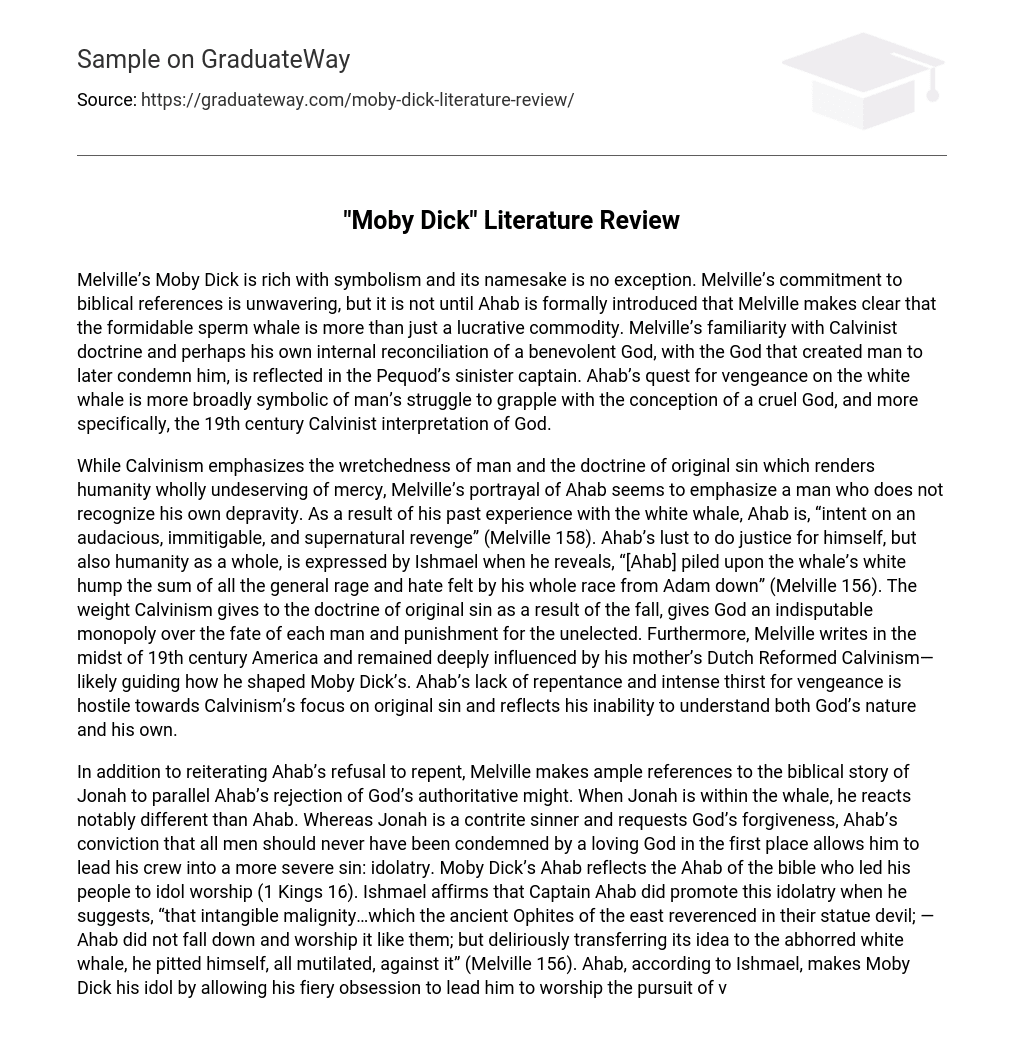Melville’s Moby Dick is rich with symbolism and its namesake is no exception. Melville’s commitment to biblical references is unwavering, but it is not until Ahab is formally introduced that Melville makes clear that the formidable sperm whale is more than just a lucrative commodity. Melville’s familiarity with Calvinist doctrine and perhaps his own internal reconciliation of a benevolent God, with the God that created man to later condemn him, is reflected in the Pequod’s sinister captain. Ahab’s quest for vengeance on the white whale is more broadly symbolic of man’s struggle to grapple with the conception of a cruel God, and more specifically, the 19th century Calvinist interpretation of God.
While Calvinism emphasizes the wretchedness of man and the doctrine of original sin which renders humanity wholly undeserving of mercy, Melville’s portrayal of Ahab seems to emphasize a man who does not recognize his own depravity. As a result of his past experience with the white whale, Ahab is, “intent on an audacious, immitigable, and supernatural revenge” (Melville 158). Ahab’s lust to do justice for himself, but also humanity as a whole, is expressed by Ishmael when he reveals, “[Ahab] piled upon the whale’s white hump the sum of all the general rage and hate felt by his whole race from Adam down” (Melville 156). The weight Calvinism gives to the doctrine of original sin as a result of the fall, gives God an indisputable monopoly over the fate of each man and punishment for the unelected. Furthermore, Melville writes in the midst of 19th century America and remained deeply influenced by his mother’s Dutch Reformed Calvinism—likely guiding how he shaped Moby Dick’s. Ahab’s lack of repentance and intense thirst for vengeance is hostile towards Calvinism’s focus on original sin and reflects his inability to understand both God’s nature and his own.
In addition to reiterating Ahab’s refusal to repent, Melville makes ample references to the biblical story of Jonah to parallel Ahab’s rejection of God’s authoritative might. When Jonah is within the whale, he reacts notably different than Ahab. Whereas Jonah is a contrite sinner and requests God’s forgiveness, Ahab’s conviction that all men should never have been condemned by a loving God in the first place allows him to lead his crew into a more severe sin: idolatry. Moby Dick’s Ahab reflects the Ahab of the bible who led his people to idol worship (1 Kings 16). Ishmael affirms that Captain Ahab did promote this idolatry when he suggests, “that intangible malignity…which the ancient Ophites of the east reverenced in their statue devil; —Ahab did not fall down and worship it like them; but deliriously transferring its idea to the abhorred white whale, he pitted himself, all mutilated, against it” (Melville 156). Ahab, according to Ishmael, makes Moby Dick his idol by allowing his fiery obsession to lead him to worship the pursuit of vengeance that is not within his dominion. Moreover, Ahab’s “broad madness…[and] his great natural intellect” aid him in bringing his mostly complicit crew on his futile quest, dragging them into his own idolatry (Melville 157). Unlike Jonah, Ahab does not repent or recognize that his sinfulness renders him undeserving of mercy, instead, he seeks to destroy what he perceives as a sadistic God who delights in man’s suffering.
Ahab’s fixation on revenge targeted at the white whale as a manifestation of the Calvinist God was doomed from the beginning. In many ways, Moby Dick represents all that is quintessentially God: nature, goodness, wrath, beauty, fear, and power. Pantheism, and even a more liberal interpretation of the bible, may suggest that God is in all things and vengeance directed at something, which is everything under God’s authority, is predestined to fail. While Jonah ran from this potent omnipresence and later returned, Ahab continues to run.





